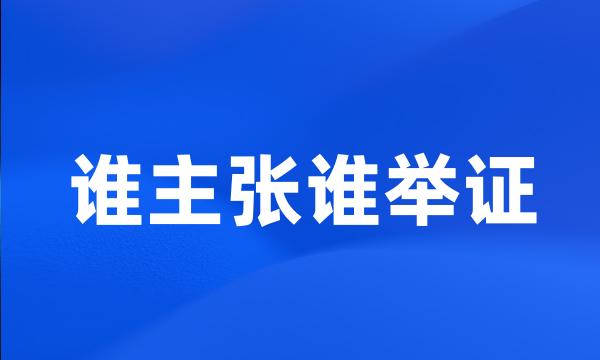谁主张谁举证
 谁主张谁举证
谁主张谁举证-
按照我国民事诉讼举证责任的一般规则,即谁主张谁举证的原则,患者或者患者家属如果不能通过证据证明患者所受损害为医疗单位的过失所致,将有可能得不到应有的赔偿。
According to the general regulation on civil action , " who is who claims the burden of proof " . Patients or their family members will not be compensated if they can not present the proof that indicates the medical unit should be responsible for the injured effect .
-
谁主张,谁举证。
He who is affirming must prove .
-
举证责任分配的一般原则就是谁主张,谁举证。
The general principle of the allocation of the burden is " who claimed , who advocated burden " .
-
劳动争议案件中,一般适用谁主张,谁举证的原则,特殊情况下适用举证责任倒置。
Labor dispute cases , the general application " who advocates who proof ," the special circumstances applicable burden of proof inversion .
-
在西方英美法系国家,“谁主张,谁举证”原则贯穿所有的诉讼活动。
In the western England America legal system country ," who advocated that , who presents evidence " the principle to pass through all lawsuits activity .
-
第三章介绍了行政合同诉讼中的举证责任,即举证责任倒置与谁主张,谁举证的原则。
The third chapter describes the burden of administrative contract lawsuit , the principle of " burden of proof " and " who advocates , who proof " .
-
本文认为,民事诉讼中举证责任的适用条件不甚明确,乃是困扰我国民事审判方式改革,影响谁主张,谁举证原则之实施的一个重要因素。
The authors argue what is not explicit about the problem of the application condition of burden of proof is a important factor puzzling the reform of civil trail model in our country .
-
证明责任分配问题是证明责任理论的一个核心问题,但在此问题上国内司法实践部门长期以来处于谁主张,谁举证的理论误区。
The distribution of the burden of proof is the core of the theory of burden of proof , while our judicial body takes it wrongfully as " who claim , who testify " .
-
提出并论证了被告人承担证明责任主要是基于谁主张,谁举证原则、刑事政策、程序公正、诉讼效率的要求。
It proposes and proves the defendant bear the burden of proof is mainly based on requirements of the principle " who advocates , who proofs ", criminal policy , procedural justice , litigation efficiency .
-
举证责任最早源于古罗马法谁主张,谁举证的诉讼规则,其最初的含义仅指当事人提出主张后向法院提供证据的义务。
The burden of persuation was derived from the procedural rules of the ancient Roman law " who advocates who proof ", the original meaning is the parties must to provide evidence after the claim to the court .
-
应当依照谁主张、谁举证的基本原理分配非法证据排除的举证责任,但是要降低证明标准并建立相关的辅助制度;
The principle of the burden of proof concerning the exclusion of illegal evidences should be person who claims shall produce evidences while a lower standard of proof should be adopted and relevant accessorial system should be established ;
-
检察机关提起公益诉讼时,处于原告的诉讼地位,又因其诉讼能力与被告旗鼓相当,所以宜遵循与普通民事诉讼一样的证明责任分配规则,即谁主张,谁举证。
When Procuratorial Organ who has Litigation capability equality with the Accused involves in public interest litigation , it should use the general standard about distribution of burden of proof in civil action that is " who claim , who quote " .
-
内容摘要:在我国《民事诉讼法》中没有举证责任这个词汇,但实际上确立了“谁主张,谁举证”的举证责任制度。
Summary : In our country ," the Code of Civil Procedure ," the burden of proof is not the term , but in fact established a " who advocate , who is the burden of proof " system of the burden of proof .
-
检察机关提起的民事公益诉讼应适用一般的举证规则,即谁主张,谁举证,社会团体和公民提起的民事公益诉讼,采用举证责任倒置原则。
Civil public interests litigation that the procuratorial organ litigates should adopt general rule of providing proof , i.e. who advocates , who provides proof . The ones that social group and citizen litigate should adopt the principle that the responsibility of providing proof is inverted .
-
涉及公众人物的案件,实行谁主张,谁举证,原告对新闻侵权行为、损害结果、侵权行为与损害结果之间的因果关系、被告存在主观过错均负证明责任。
Refer to the case of public figures , it should be " the proof one sound " plaintiff should bear burden of proof both of news tort action , damage results , the reason and results of tort and damages and proof of subjective fault .
